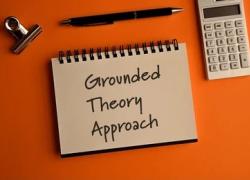How to structure Grounded Theory Research Design with some useful Examples?
In the vast landscape of qualitative research, Grounded Theory stands as a methodological beacon, offering researchers a unique lens through which they can explore, analyze, and understand complex phenomena. Developed by Glaser and Strauss in the 1960s, Grounded Theory has since evolved, captivating researchers across disciplines with its focus on building theories from the ground up, grounded in the data itself.
In this blog post, we briefly discuss how to structure grounded theory research design with some hypothetical examples from different disciplines such as Education, Psychology and Nursing. The post is mainly focused on the following important areas:
- What types of researchers utilize grounded theory research in their work?
- What is the common format or structure of a grounded theory Research Study?
- Example of a grounded theory research design in the field of Psychology
- Example of a grounded theory research design in Education.
- Example of grounded theory research design in Nursing
- Example of a grounded theory research design focusing on understanding the experience of individuals transitioning to remote work during the COVID-19 pandemic.
These topics are discussed here one by one in detail.
What types of researchers utilize grounded theory in their research work?
Grounded theory research is utilized by a diverse range of researchers across various disciplines and fields. The flexible and inductive nature of grounded theory makes it applicable to numerous areas of study where there is a need to generate theories grounded in empirical data. Here are some examples of who utilizes grounded theory research:
- Sociologists: Sociologists often use grounded theory to explore social phenomena, interactions, and structures. It is particularly well-suited for investigating the processes and meanings that individuals attach to their experiences in different social contexts. Social work researchers employ grounded theory to explore social issues, interventions, and the experiences of individuals and communities. It is valuable for developing theories that inform social work practice.
- Psychologists: Psychologists utilize grounded theory to explore the lived experiences of individuals, understand psychological processes, and develop theories grounded in qualitative data. It is commonly employed in areas such as clinical psychology, counseling, and health psychology.
- Nurses and healthcare professionals: Grounded theory is frequently used in nursing research to explore healthcare experiences, patient interactions, and issues related to healthcare delivery. It is valuable for gaining insights into the perspectives of both healthcare providers and patients.
- Educators: Educators and researchers in the field of education use grounded theory to investigate various aspects of teaching and learning. This may include understanding student experiences, exploring effective teaching strategies, or examining educational policies.
- Management and organizational researchers: Grounded theory is employed by researchers in management and organizational studies to explore workplace dynamics, organizational change, leadership, and other aspects of organizational behavior. Researchers in business and marketing may use grounded theory to explore consumer behavior, market trends, and organizational strategies. It helps in developing theories that are grounded in the experiences and behaviors of stakeholders.
- Anthropologists: Anthropologists utilize grounded theory to study cultures, social structures, and human behaviors. It is particularly useful for capturing the richness and complexity of cultural phenomena.
- Communication Scholars: Grounded theory is applied in communication research to explore the ways individuals communicate, construct meaning, and navigate interpersonal relationships. It is used to develop theories grounded in communicative practices.
In essence, grounded theory is a versatile qualitative research approach that is utilized by researchers across disciplines when there is a need to systematically explore, understand, and develop theories from the data itself. The method’s flexibility makes it applicable to a wide range of research questions and contexts. Overall, it is a valuable tool for anyone who wants to gain a deeper understanding of a particular phenomenon, develop new theories, and inform practical action. Its flexibility and adaptability make it suitable for a wide range of disciplines and applications.
What is the common format or structure of a grounded theory research study?
While the specific format or structure of a grounded theory research study can vary depending on the research topic and researcher’s preferences, grounded theory research studies generally follow a common format. There are some common elements widely used that are typically included in the final report. Here’s a general outline of the common format or structure of a grounded theory research study:
- Title:
- Provide a concise and informative title that reflects the essence of the research.
- Provide a concise and informative title that reflects the essence of the research.
- Abstract:
- Summarize the key aspects of the study, including the research problem, methods, findings, and implications. The abstract should provide a brief overview of the entire research, the methodology used and the findings of the study.
- Summarize the key aspects of the study, including the research problem, methods, findings, and implications. The abstract should provide a brief overview of the entire research, the methodology used and the findings of the study.
- Introduction:
- Introduce the research problem and the context in which it is situated. Provide a rationale for using grounded theory and clearly state the research question or objective. Briefly introduce the research topic, highlighting its significance and existing knowledge gaps. Explain the study’s objectives and expected outcomes.
- Introduce the research problem and the context in which it is situated. Provide a rationale for using grounded theory and clearly state the research question or objective. Briefly introduce the research topic, highlighting its significance and existing knowledge gaps. Explain the study’s objectives and expected outcomes.
- Literature Review (Optional):
- While grounded theory often begins with minimal preconceptions, some studies may include a brief literature review to contextualize the research problem and identify any existing gaps. Provide a critical analysis of relevant literature, identifying key concepts, theoretical frameworks, and areas for further investigation.
- While grounded theory often begins with minimal preconceptions, some studies may include a brief literature review to contextualize the research problem and identify any existing gaps. Provide a critical analysis of relevant literature, identifying key concepts, theoretical frameworks, and areas for further investigation.
- Theoretical Framework (Optional):
- In some cases, researchers may articulate a broad theoretical framework that informs the study. This could include concepts or ideas relevant to the research problem.
- In some cases, researchers may articulate a broad theoretical framework that informs the study. This could include concepts or ideas relevant to the research problem.
- Methodology:
- Describe the research design, data collection methods, and data analysis procedures. Explain how theoretical sampling was used and provide details about the participants, setting, and any ethical considerations. Briefly describe the chosen grounded theory approach and justify its selection for the research question and context. Describe the methods used to collect data (e.g., interviews, observations, documents), including the rationale for choosing each method and the data collection instruments or protocols.
- Describe the research design, data collection methods, and data analysis procedures. Explain how theoretical sampling was used and provide details about the participants, setting, and any ethical considerations. Briefly describe the chosen grounded theory approach and justify its selection for the research question and context. Describe the methods used to collect data (e.g., interviews, observations, documents), including the rationale for choosing each method and the data collection instruments or protocols.
- Data Analysis:
- Present the process of data analysis, including open coding, constant comparison, axial coding, and selective coding. Discuss the emergence of categories, themes, and the development of the grounded theory. Explain the procedures for data coding, analysis, and theory development, including specific coding techniques (e.g., open, axial, selective) and how constant comparison is used throughout the process.
- Present the process of data analysis, including open coding, constant comparison, axial coding, and selective coding. Discuss the emergence of categories, themes, and the development of the grounded theory. Explain the procedures for data coding, analysis, and theory development, including specific coding techniques (e.g., open, axial, selective) and how constant comparison is used throughout the process.
- Theoretical Integration:
- Explain how the grounded theory was integrated and refined through ongoing analysis. Discuss the core category and its relationships with other categories.
- Explain how the grounded theory was integrated and refined through ongoing analysis. Discuss the core category and its relationships with other categories.
- Saturation:
- Report on the point of saturation, indicating when data collection ceased because no new information or insights were emerging.
- Report on the point of saturation, indicating when data collection ceased because no new information or insights were emerging.
- Validation Strategies (Optional):
- If applicable, discuss any validation strategies employed, such as member checking or peer debriefing, to enhance the credibility and trustworthiness of the study.
- If applicable, discuss any validation strategies employed, such as member checking or peer debriefing, to enhance the credibility and trustworthiness of the study.
- Findings:
- Present the major findings of the study, including the core category, key categories, and their relationships. Use quotes and examples from the data to illustrate concepts. Present the key themes, concepts, and categories identified through data analysis. Explain the relationships between these categories and how they contribute to the development of a grounded theory. Discuss the limitations of the study and how they might influence the interpretation of the results.
- Present the major findings of the study, including the core category, key categories, and their relationships. Use quotes and examples from the data to illustrate concepts. Present the key themes, concepts, and categories identified through data analysis. Explain the relationships between these categories and how they contribute to the development of a grounded theory. Discuss the limitations of the study and how they might influence the interpretation of the results.
- Discussion & Conclusion
- Interpret the findings in the context of existing literature, theoretical perspectives, and the broader implications of the grounded theory. Discuss how the developed theory contributes to understanding the phenomenon. Analyze the findings in relation to the existing literature and established theories, highlighting significant contributions and novel insights. Discuss the implications of the research and future research directions. Summarize the key conclusions of the study and emphasize the theoretical significance of the grounded theory developed. Summarize the main findings, contributions, and implications of the study.
- Interpret the findings in the context of existing literature, theoretical perspectives, and the broader implications of the grounded theory. Discuss how the developed theory contributes to understanding the phenomenon. Analyze the findings in relation to the existing literature and established theories, highlighting significant contributions and novel insights. Discuss the implications of the research and future research directions. Summarize the key conclusions of the study and emphasize the theoretical significance of the grounded theory developed. Summarize the main findings, contributions, and implications of the study.
- References:
- Include a comprehensive list of references, citing relevant literature and sources that informed the study.
- Include a comprehensive list of references, citing relevant literature and sources that informed the study.
- Appendices (If Necessary):
- Include any additional materials, such as interview guides, coding manuals, or supplementary data, in the appendices.
- Include any additional materials, such as interview guides, coding manuals, or supplementary data, in the appendices.
By following this comprehensive format, researchers can ensure that their grounded theory research studies are well-structured, transparent, and effectively communicate the research process, findings, and theoretical contributions. It’s important to note that the specific format may vary based on the requirements of the academic institution, the publication venue, or the preferences of the researcher. Researchers should carefully follow any guidelines provided by the target publication or academic institution.
Example of a grounded theory research design in the field of Psychology
Let us discuss a hypothetical example of a grounded theory research design in the field of psychology. In this suppositional study, we will focus on understanding the coping mechanisms of individuals who have experienced traumatic events. Remember that this example is for illustrative purposes only. The novice researchers and students shall take help from it while designing their research studies in any field of interest.
Title: “Navigating the Abyss: A Grounded Theory Exploration of Coping Mechanisms in Survivors of Traumatic Events”
Abstract: This research aims to develop a grounded theory of coping mechanisms employed by individuals who have experienced traumatic events. Grounded theory methodology will guide data collection and analysis. Participants will be selected through purposeful sampling, and in-depth interviews will be conducted to explore their experiences. Open coding, constant comparison, and theoretical sampling will be employed to analyze the data, with the goal of identifying core categories and relationships. The emerging grounded theory will contribute to the understanding of adaptive coping strategies in the aftermath of trauma.
Introduction: The introduction will provide background information on trauma, the relevance of understanding coping mechanisms, and the rationale for employing grounded theory methodology. The research problem, objectives, and significance will be clearly articulated.
Literature Review (Optional): While grounded theory often starts with minimal preconceptions, a brief literature review may be included to highlight existing theories of coping with trauma. This review would not be exhaustive but would set the stage for the study.
Methodology:
- Research Design: Grounded theory methodology will guide the study.
- Participants: Purposeful sampling will be used to select individuals who have experienced various types of traumatic events.
- Data Collection: In-depth interviews will be conducted to gather rich, qualitative data.
- Data Analysis: Open coding, constant comparison, axial coding, and selective coding will be applied to analyze the data.
- Theoretical Sampling: Theoretical sampling will guide additional data collection based on emerging insights.
- Ethical Considerations: Ethical guidelines will be followed to ensure participant well-being and confidentiality.
Data Analysis: This section will detail the step-by-step process of data analysis, including examples of codes, categories, and the development of the emerging grounded theory. It will emphasize the iterative nature of the analysis, with constant comparison and theoretical sensitivity.
Theoretical Integration: The theoretical integration section will present the synthesized grounded theory, highlighting the core category and its relationships with supporting categories. The researcher will discuss how the theory emerged from the data and contributes to the understanding of coping mechanisms post-trauma.
Saturation: The saturation point will be discussed, indicating when data collection ceased due to the richness and depth of the insights gathered.
Findings: The findings section will present key themes and insights derived from the data, supported by quotes and examples from the participants.
Discussion: The discussion will interpret the findings in relation to existing literature, theoretical frameworks, and the broader implications for psychology and trauma research. It will explore the contributions of the developed grounded theory.
Conclusion: The conclusion will summarize the main findings, contributions, and potential avenues for future research in the field of trauma and coping.
References: A comprehensive list of references will be included, citing relevant literature and theoretical frameworks that informed the study.
This example illustrates how a grounded theory research design could be structured in a professional and comprehensive manner. Researchers should tailor the structure based on specific guidelines from academic institutions or publications.
Example of a grounded theory research design in Education.
Let us explore a comprehensive example of a grounded theory research design in the field of education. In this hypothetical study, we will focus on understanding the process of student engagement in online learning environments. You must understand that this example/skeleton is for illustrative purposes only. The novice researchers and students shall take help from it while designing their research studies in any field of interest.
Title: “Unveiling Virtual Dynamics: A Grounded Theory Exploration of Students’ Engagement in Online Learning Environments”
Abstract: This research seeks to develop a grounded theory illuminating the dynamics of student engagement in online learning environments. Grounded theory methodology will guide data collection and analysis. A diverse sample of online learners will be purposefully selected, and in-depth interviews, virtual observations, and document analysis will be employed to gather data. Open coding, constant comparison, and theoretical sampling will drive the analysis, revealing patterns and relationships. The resulting grounded theory aims to inform educational practices in the evolving landscape of virtual learning.
Introduction: The introduction will provide an overview of the increasing prevalence of online learning, the significance of student engagement, and the need for a grounded understanding of how students engage in virtual classrooms. The research problem, objectives, and relevance will be articulated.
Literature Review (Optional): A concise literature review may be included to contextualize the study within existing theories of student engagement and online learning. This section will not be exhaustive but will provide a foundation for the research.
Methodology:
- Research Design: Grounded theory methodology will guide the study.
- Participants: Purposeful sampling will be used to select a diverse group of online learners.
- Data Collection: In-depth interviews, virtual observations, and document analysis will be employed to collect rich, qualitative data.
- Data Analysis: Open coding, constant comparison, axial coding, and selective coding will be applied iteratively to analyze the data.
- Theoretical Sampling: Theoretical sampling will guide additional data collection based on emerging insights.
- Ethical Considerations: Ethical guidelines will be followed to protect participant privacy and uphold research integrity.
Data Analysis: This section will detail the systematic process of data analysis, providing examples of initial codes, evolving categories, and the emergence of the grounded theory. The iterative nature of the analysis will be emphasized.
Theoretical integration: The theoretical integration section will present the synthesized grounded theory, highlighting the core category and its connections to supporting categories. The researcher will discuss how the theory is grounded in the data and its implications for understanding student engagement in online learning environments.
Saturation: The researcher will discuss the point of data saturation, indicating when data collection concluded due to the comprehensive exploration of the phenomenon.
Findings: The findings section will present key themes and insights derived from the data, supported by quotes and examples from participants.
Discussion: The discussion will interpret the findings in relation to existing literature, theoretical frameworks, and the broader implications for online education. It will explore how the grounded theory contributes to the field.
Conclusion: The conclusion will summarize the main findings, contributions, and potential areas for further research, emphasizing the practical applications for enhancing student engagement in online learning.
References: A comprehensive list of references will be included, citing relevant literature and theoretical frameworks that informed the study.
This example demonstrates how a grounded theory research design in education could be structured in a professional and comprehensive manner. Researchers should adapt the structure based on specific guidelines from academic institutions or publications.
Example of a grounded theory research design in Nursing
Let us consider another example of a grounded theory research design in the field of nursing. In this hypothetical study, we will focus on understanding the coping strategies employed by nurses in managing emotional stress in critical care settings. Remember that this example is for illustrative purposes only.
Title: “Resilience in Crisis: A Grounded Theory Exploration of Coping Strategies among Critical Care Nurses in Managing Emotional Stress”
Abstract: This research seeks to develop a grounded theory illuminating the coping strategies utilized by critical care nurses in navigating emotional stress within their demanding work environment. Grounded theory methodology will guide data collection and analysis. Purposeful sampling will be employed to select critical care nurses with diverse experiences, and data will be collected through in-depth interviews and reflective journal analysis. Open coding, constant comparison, and theoretical sampling will be applied iteratively to analyze the data and derive a grounded theory that informs the development of targeted interventions to support nurse well-being.
Introduction: The introduction will provide an overview of the challenging nature of critical care nursing, the importance of understanding nurses’ coping strategies, and the need for a grounded exploration of their experiences. The research problem, objectives, and significance will be clearly articulated.
Literature Review (Optional): A concise literature review may be included to contextualize the study within existing theories of nurse resilience, coping in healthcare, and the unique stressors faced by critical care nurses. This section will not be exhaustive but will provide a foundation for the research.
Methodology:
- Research Design: Grounded theory methodology will guide the study.
- Participants: Purposeful sampling will be used to select critical care nurses with varying levels of experience.
- Data Collection: In-depth interviews and reflective journal analysis will be employed to gather comprehensive qualitative data.
- Data Analysis: Open coding, constant comparison, axial coding, and selective coding will be applied iteratively to analyze the data.
- Theoretical Sampling: Theoretical sampling will guide additional data collection based on emerging insights.
- Ethical Considerations: Ethical guidelines will be followed to ensure participant confidentiality and research integrity.
Data Analysis: This section will detail the systematic process of data analysis, providing examples of initial codes, evolving categories, and the emergence of the grounded theory. The iterative nature of the analysis will be emphasized.
Theoretical Integration: The theoretical integration section will present the synthesized grounded theory, emphasizing the core category and its relationships with supporting categories. The researcher will discuss how the theory is grounded in the experiences of critical care nurses and contributes to the development of targeted support strategies.
Saturation: The researcher will discuss the point of data saturation, signifying when data collection concluded due to the comprehensive exploration of nurses’ coping strategies.
Findings: The findings section will present key themes and insights derived from the data, supported by quotes and examples from critical care nurses.
Discussion: The discussion will interpret the findings in relation to existing literature, theoretical frameworks, and the broader implications for nursing practice. It will explore how the grounded theory contributes to improving nurse well-being in critical care settings.
Conclusion: The conclusion will summarize the main findings, contributions, and potential areas for further research, emphasizing the practical applications for enhancing coping strategies among critical care nurses.
References: A comprehensive list of references will be included, citing relevant literature and theoretical frameworks that informed the study.
This example illustrates how a grounded theory research design in nursing could be structured in a professional and comprehensive manner. Researchers should adapt the structure based on specific guidelines from academic institutions or publications.
Example of a grounded theory research design in the field of Nursing focusing on understanding the experience of individuals transitioning to remote work during the COVID-19 pandemic.
Let us create a comprehensive and professional example of a grounded theory research design focusing on understanding the experiences of individuals transitioning to remote work during the COVID-19 pandemic.
Title: “Navigating the Shift: A Grounded Theory Exploration of Nurses’ Experiences in Transitioning to Remote Work During the COVID-19 Pandemic”
Abstract: This research aims to develop a grounded theory shedding light on the experiences of nurses transitioning to remote work during the COVID-19 pandemic. Grounded theory methodology will guide data collection and analysis. Purposive sampling will be employed to select nurses with varying roles, and data will be collected through virtual interviews and document analysis. Open coding, constant comparison, and theoretical sampling will be applied iteratively to analyze the data, generating a grounded theory that contributes to understanding the challenges and successes in the remote work transition for nurses.
Introduction: The introduction will provide context for the study by discussing the unprecedented challenges posed by the COVID-19 pandemic, the necessity for remote work in healthcare, and the need for a grounded exploration of nurses’ experiences in this transition. The research problem, objectives, and significance will be clearly articulated.
Literature Review (Optional): A concise literature review may be included to contextualize the study within existing theories of remote work in healthcare, the impact of the pandemic on nursing practice, and the unique challenges faced by nurses in virtual work settings. This section will not be exhaustive but will provide a foundation for the research.
Methodology:
- Research Design: Grounded theory methodology will guide the study.
- Participants: Purposive sampling will be used to select nurses with diverse roles and experiences.
- Data Collection: Virtual interviews and document analysis (e.g., communications, policies) will be employed to gather comprehensive qualitative data.
- Data Analysis: Open coding, constant comparison, axial coding, and selective coding will be applied iteratively to analyze the data.
- Theoretical Sampling: Theoretical sampling will guide additional data collection based on emerging insights.
- Ethical Considerations: Ethical guidelines will be followed to ensure participant confidentiality and research integrity.
Data Analysis: This section will detail the systematic process of data analysis, providing examples of initial codes, evolving categories, and the emergence of the grounded theory. The iterative nature of the analysis will be emphasized.
Theoretical Integration: The theoretical integration section will present the synthesized grounded theory, emphasizing the core category and its relationships with supporting categories. The researcher will discuss how the theory is grounded in the experiences of nurses transitioning to remote work during the pandemic and contributes to the understanding of virtual work in healthcare.
Saturation: The researcher will discuss the point of data saturation, indicating when data collection concluded due to the comprehensive exploration of nurses’ experiences.
Findings: The findings section will present key themes and insights derived from the data, supported by quotes and examples from nurses.
Discussion: The discussion will interpret the findings in relation to existing literature, theoretical frameworks, and the broader implications for nursing practice. It will explore how the grounded theory contributes to improving the understanding of remote work challenges and successes for nurses during the COVID-19 pandemic.
Conclusion: The conclusion will summarize the main findings, contributions, and potential areas for further research, emphasizing the practical applications for supporting nurses in virtual work settings.
References: A comprehensive list of references will be included, citing relevant literature and theoretical frameworks that informed the study.
Conclusion:
Understanding how to structure a grounded theory research design is pivotal for researchers aiming to delve into the rich complexities of their chosen phenomena. By following the systematic steps outlined in this post, from open coding to theoretical saturation, researchers can establish a robust framework that allows emergent themes to guide the study. Moreover, the accompanying hypothetical examples offer a practical glimpse into the application of grounded theory across various disciplines. As you embark on your own research journey, remember that the flexibility of grounded theory allows for an organic exploration, fostering deep insights and contributing valuable knowledge to your chosen field.


















